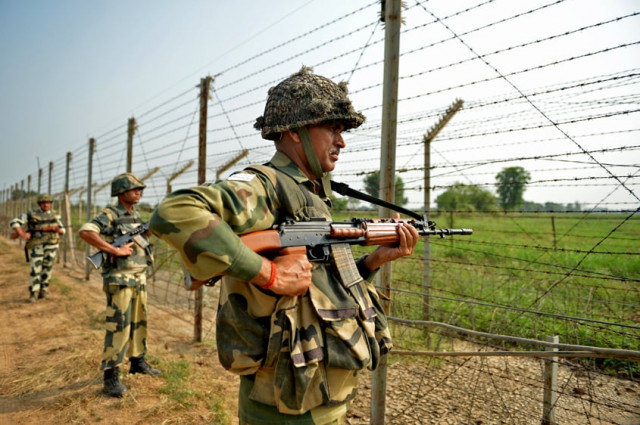India’s delusions
Let us review what a surgical strike is and its implications

PHOTO: AFP
Ironically, while the Indian media was also reporting these as fire violations, but initiated by Pakistan, no less than the Indian Director General Military Operations came on air to assert that India had executed two “Surgical Strikes” against Pakistan; an obvious response to the alleged attack by Pakistanis on Uri.
Before examining the veracity of such claims, let us review what a surgical strike is and its implications.
By definition, a surgical strike is a strike that, like a surgeon’s knife, penetrates as deep as necessary, executes its task and escapes relatively unscathed. Obviously, such a strike could be executed by any service, by land, air or sea.
Since the Indian claim is land based, let us examine that. But remember that this strike was intended to be “punitive”. And, while depth of penetration is not necessarily a prerequisite for a punitive strike, the target must be one that insults, or at least embarrasses, and inflicts damage; or the effort is futile.
From the Kel valley to the Jehlum valley is a distance of about 150 kilometers. It’s rugged terrain of heights ranging from 5,000 to 19,000 feet ASL. There are a few shallow and not-very-wide valleys but, between most heights lie deep ravines. There are three major and, in this season, fairly torrential rivers: Neelum, Jhelum, and Munawwar Tawi.
Before it was fenced off, the terrain was ideal for infiltration, but not for surgical operations. Furthermore, there are only thinly manned posts there, because the ‘benches’ on most heights have insufficient space. And, while all posts are logistically self-contained, even their destruction has little overall effect.
South of Poonch, the heights taper off but Munawwar Tawi is a massive obstacle. A punitive surgical strike executed overland in this region would have to penetrate sufficiently deep to embarrass Pakistan and, in this terrain, could only be done by infiltration.
I am not implying that Indian land forces could not do so but, had they done so a) it would be impossible for Pakistan to refute, since the attack would be caught by some satellite b) exfiltration of Indian soldiers would take time and would be casualty intensive.
And then, it would be meaningless for India not to identify the targets they hit. Not only did the DGMO omit this but refused to respond to specific questions. Among others, the Indian politician Sitaram Yechury was seen on TV decrying the lack of information.
At this stage let us examine the theoretical process of “Escalation” in context.
If a surgical strike were to be carried out by (say) the US on (say) Afghanistan; two manifestly unequal military powers, there could be little chance of any retaliation by conventional means. Distance and military capability preclude the possibility. The same applies to drone attacks by the US on Pakistani soil.
But that is not the military equation between neighbours like Pakistan and India.
In our equation, such a strike will either succeed or it will not. If it doesn’t succeed, the resultant embarrassment to Delhi will necessitate a repeat till it does. So, let us assume it has.
If it does succeed, and Indian forces, after inflicting punitive damage, escape relatively unscathed, Pakistan will either respond or not respond by an overt or covert operation.
If Pakistan does not respond by either, the question as to whether the strike was sufficiently punitive might result in necessitating a repeat. This possibility will be encouraged by Pakistan’s lack of response.
If Pakistan does respond, whether through overt or covert means, another punitive strike of increasing intensity will be inevitable.
And so, unless one side decides to choose the course of sanity, we will be riding a self-propelling escalatory ladder that will logically lead us to the final war.
Even choosing the course of sanity, after a punitive strike has been executed, and seeking de-escalation by refusing to respond is no guarantee against the inexorable course charted by the decision to execute a punitive strike by conventional means.
A refusal to respond will be virtually impossible under the domestic public and political pressure that such a strike by India will cause. But if we had a leader with the immense courage, confidence, and sagacity required to take such a course, it might still not result in de-escalation.
I said earlier that a refusal to respond would result in the question as to whether the Indian strike was sufficiently punitive or not. But even if it is still considered punitive enough, Pakistan’s lack of response is likely to be construed as cowardice or lack of capability and/or will.
Indian analysts as well as those from other countries quote Kargil as an example of a war between nuclear states which was not allowed to escalate. It didn’t, but it’s not a good example for numerous reasons.
Consequently, if the Indian angst, justifiable or not, is assuaged by these “surgical strikes”, let their claim stand. Let my Indian friends gloat while Pakistanis hide their smirks.
Published in The Express Tribune, October 7th, 2016.
Like Opinion & Editorial on Facebook, follow @ETOpEd on Twitter to receive all updates on all our daily pieces.













COMMENTS
Comments are moderated and generally will be posted if they are on-topic and not abusive.
For more information, please see our Comments FAQ